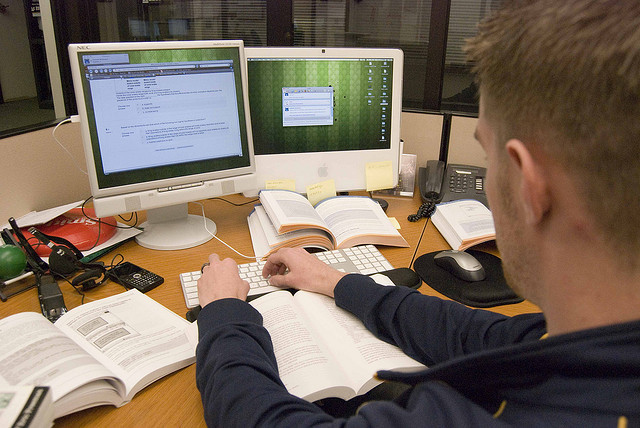Homeschooling has been around for centuries, but online school is a comparatively recent innovation. In the last decade, all kinds of online education options have popped up, providing homeschooling parents with more options than there are curriculum stands at a homeschool convention.
From Christian online academies to state online schools to post-secondary classes, the avenues for homeschooling seem infinite. The new question is: Do online classes “count” as homeschooling? Some parents whose kids take online classes consider themselves homeschoolers, but others do not.
Freedom to Choose Curriculum
For Debi Ketron, director of the Indiana Association of Home Educators, homeschooling means the parents choose the classes, the schedule, and, most importantly, the teachers.
“We say that homeschooling is home-based and parent-directed and privately funded,” Ketron said. “The online public schools, we would not recommend that. In Indiana, ‘homeschool’ is a non-accredited non-public school, and that’s not at all what virtual schools are in Indiana. They’re just extensions of the public schools.”
Online public schools, like Indiana Connections Academy and the Florida Virtual School, are extensions of the public school system because they are funded by the government and use the same curriculum as their traditional brick-and-mortar counterparts.
“Public online schools are not the same [as homeschooling]; [they’re] still government-funded,” Ketron said. “We don’t want to lose that definition of home education. When you take government money, there’s always strings attached. We choose freedom because we can choose our own curriculum.”
Ketron is very aware of the differences between online public schools and home education, but she said many parents are starting to get confused.
“[Some parents have] told us the day they pull their children out of school, they get a call from the local public school telling them ‘Oh, you want to homeschool, here’s where you sign up,’ telling them to enroll in an online school which turned out to be a public school,” Ketron said. “So then they come to us and say, ‘This isn’t what we signed up for,’ and then we spend a lot of time telling people, ‘That’s not homeschooling.'”
Flexible Public Schooling
Offering public school classes online is helpful for children with different learning abilities and parents who desire a more flexible schedule, said Polly Haldeman, director of the Florida Virtual School. FVS is a state-funded public, online school.
“Taking away the restriction of a class bell schedule at school—online schooling is more about what the student needs,” Haldeman said. “It’s defined by the student. Online schools provide access to rural districts and low-economic areas regardless of place.”
Haldeman acknowledges that public online schools, such as FVS, are extensions of state schools.
“We are partners with our district. We are a school district, so we receive state funding,” Haldeman said. “The majority of our teachers only teach online, but some do both [brick-and-mortar and online]. The other differentiator is the availability—[teachers] are there when the kids need them. You get the best of both worlds—the flexibility, the freedom, and the high-quality teachers.”
Although homeschoolers use private online academies such as Veritas Press Academy and the Potter’s School, these are defined as “schools,” not homeschooling, because the teachers and curriculum are chosen by the school’s board of directors. Amy Canaday, another homeschooling mom from Indiana, says these kinds of schools can be helpful for homeschooling parents, but said online public schools could also harm the homeschool movement by attracting families away from homeschooling.
“I would say [online public schools] would negatively affect homeschooling,” Canaday said. “What homeschoolers do is so different from families who choose online public school, which is different in purpose and different in scope, except for the fact that it’s at home. I think outsiders could see what online public school looks like, then compare that to traditional homeschoolers, and it’s not going to be the same.”
Supplementary Classes Versus All-Online
Perhaps the biggest distinctions between homeschooling and online schools are who chooses the curriculum and whether online classes comprise the bulk of schooling or fill in a few holes. Ketron homeschooled all four of her children after listening to author Greg Harris speak in Springfield, Ohio.
“Before that, I didn’t understand [homeschooling] and thought it was just so weird,” Ketron said. “When he [Harris] explained it, I thought, ‘Oh, that makes so much sense and it’s such a great idea.'”
In the early 2000s, Ketron experimented with online schooling when her eldest daughter took a dual-credit college English class through a program run jointly by Indiana and Purdue universities. Their third son later also took an online class, on common law with Homeschool Legal Defense Association founder and lawyer Michael Farris.
Canaday enrolled her children in some online classes, but she says she wants to remain in control of her children’s education.
Canaday looked into using Veritas Press Academy for her children, but the cost didn’t fit the family budget. Instead, she registered her daughter to take a Spanish class through Philippians4.com, and she didn’t use any other online options.
“There are lots of different reasons to do something online,” Canaday said. “For us personally, we would not want the bulk of our child’s education to be online. There are situations where something online would be a benefit to a student’s education.”
Kate Patrick ([email protected]) writes from Cincinnati, Ohio. Follow her on Twitter @KatePatrick.
Photo by Mr_Stein.




